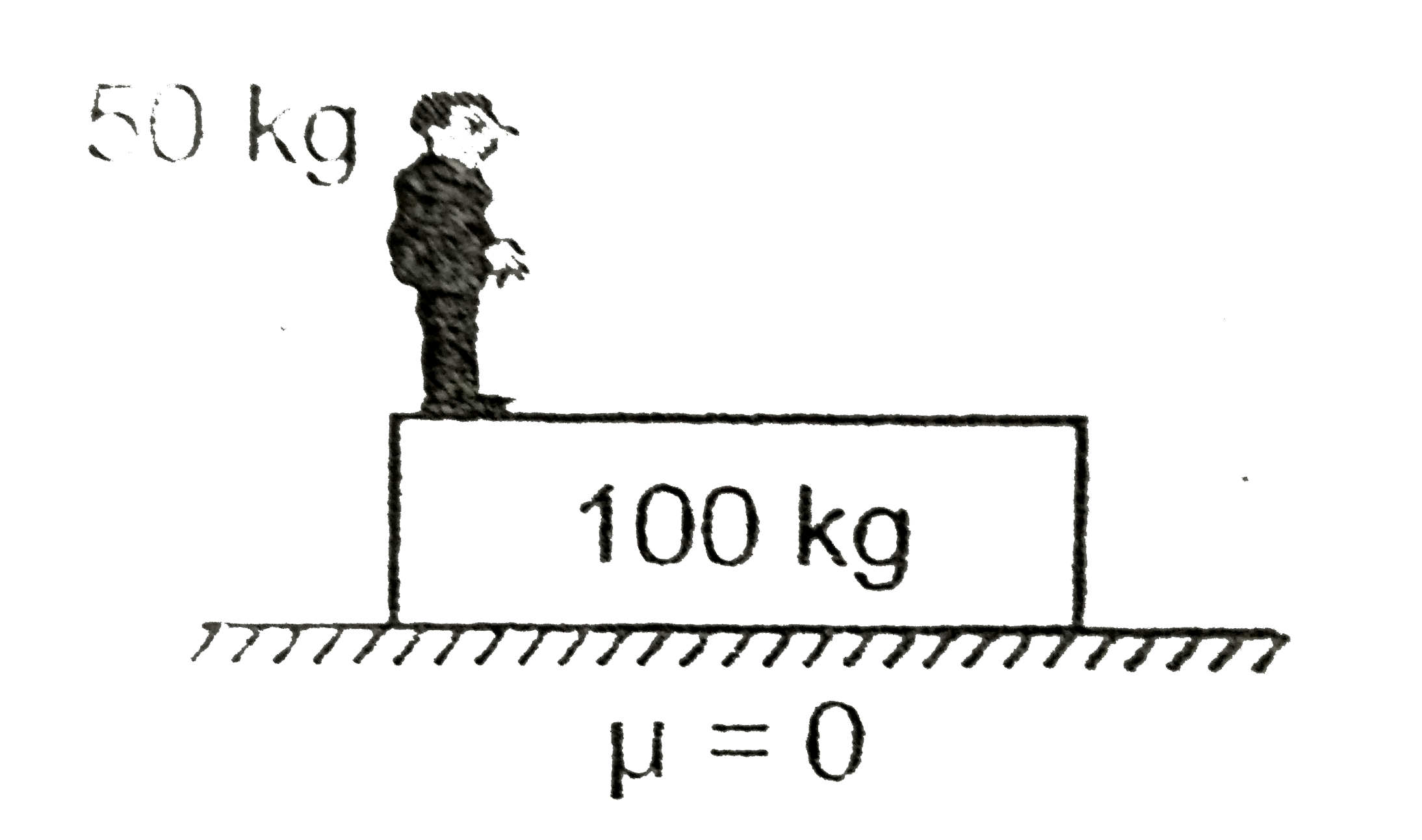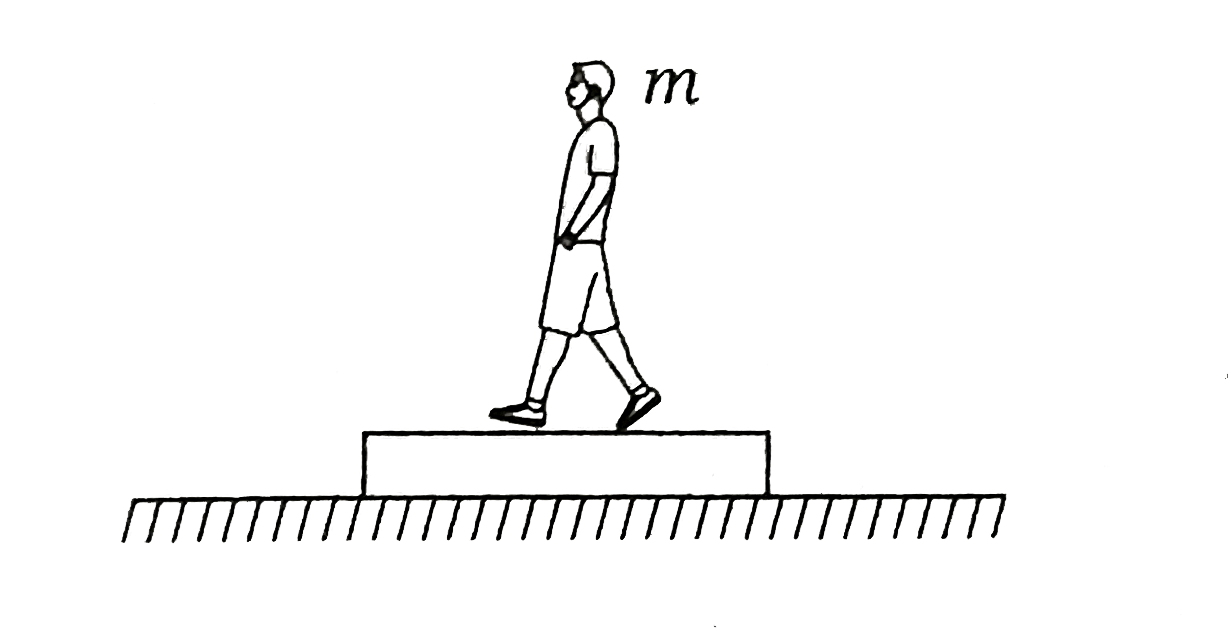A man (mass = 50 kg) and his son (mass = 20 kg) are standing on a frictionless surface facing each other. The man pushes his son so that he starts moving at a speed of 0.70ms−1 with respect to the man. The speed of the man with respect to the surface is:
0.14ms−1
0.47ms−1
0.28ms−1
0.20ms−1
The correct Answer is:D
To solve the problem, we will use the principle of conservation of momentum. Let's break down the steps:
Step 1: Understand the System
- We have a man with mass m1=50kg and his son with mass m2=20kg.
- They are initially at rest on a frictionless surface, so their initial velocities are both 0.
Step 2: Define the Velocities
- Let v be the velocity of the man after he pushes his son.
- The son moves away from the man with a speed of 0.70m/s relative to the man. Therefore, if the man moves with speed v, the speed of the son vs with respect to the surface will be:
vs=v+0.70m/s
Step 3: Apply Conservation of Momentum
- The initial momentum of the system is 0 (since both are at rest).
- The final momentum of the system must also equal 0. Thus, we can write:
m1⋅(−v)+m2⋅(v+0.70)=0
Here, the man's momentum is negative because he moves in the opposite direction to his son.
Step 4: Substitute the Masses
- Substituting the values of m1 and m2:
50⋅(−v)+20⋅(v+0.70)=0
Step 5: Expand and Rearrange the Equation
- Expanding the equation gives:
−50v+20v+14=0
Combining like terms:
−30v+14=0
Step 6: Solve for v
- Rearranging the equation:
30v=14
v=1430=715≈0.4667m/s
Step 7: Find the Speed of the Man
- The speed of the man with respect to the surface is:
v≈0.4667m/s
Final Answer
The speed of the man with respect to the surface is approximately 0.4667m/s.
---
- We have a man with mass m1=50kg and his son with mass m2=20kg.
- They are initially at rest on a frictionless surface, so their initial velocities are both 0.
- Let v be the velocity of the man after he pushes his son.
- The son moves away from the man with a speed of 0.70m/s relative to the man. Therefore, if the man moves with speed v, the speed of the son vs with respect to the surface will be:
vs=v+0.70m/s
- The initial momentum of the system is 0 (since both are at rest).
- The final momentum of the system must also equal 0. Thus, we can write:
m1⋅(−v)+m2⋅(v+0.70)=0
Here, the man's momentum is negative because he moves in the opposite direction to his son.
- Substituting the values of m1 and m2:
50⋅(−v)+20⋅(v+0.70)=0
- Expanding the equation gives:
−50v+20v+14=0
Combining like terms:
−30v+14=0
- Rearranging the equation:
30v=14
v=1430=715≈0.4667m/s
- The speed of the man with respect to the surface is:
v≈0.4667m/s
The speed of the man with respect to the surface is approximately 0.4667m/s.
Similar Questions
A man of mass m1 = 80 kg is standing on a platform of mass m2 = 20 kg that lies on a frictionless horizontal surface. The man starts moving on the platform with a velocity vr = 10 m/s relative to the platform. Find the recoil speed of the platform.
View SolutionA man of mass 50kg us standing on a 100kg plank kept on a fricitonless horizontal floor. Initially both are at rest. If the man starts walking on the plank with speed 6m/s towards right relative to the plank, then amount of muscle energy spent by the man is
 View Solution
View Solution
Knowledge Check
- Question 1 - Select One
To a stationary man, rain appears to be falling at his back at an angle 30∘ with the vertical. As he starts moving forward with a speed of 0.5ms−1, he finds that the rain is falling vertically.
The speed of rain with respect to the moving man is.A0.5ms−1B1.0ms−1C0.5√3ms−1D0.45ms−1 - Question 2 - Select One
To a stationary man, rain appears to be falling at his back at an angle 30∘ with the vertical. As he starts moving forward with a speed of 0.5ms−1, he finds that the rain is falling vertically.
The speed of rain with respect to the stationary man is.A0.5ms−1B1.0ms−1C0.5(√3)ms−1D0.43ms−1 - Question 3 - Select One
A man of mass m is standing on a plank of equal mass m resting on a smooth horizontal surface. The man starts moving on the plank with speed u relative to the plank. The speed of the man relative to the ground is
 A2uBu2CzeroDu4
A2uBu2CzeroDu4
A man of mass 50 kg starts moving on the earth and acquires speed of 1.8 m/s. with what speed does the earth recoil? Mass of earth =6×1024kg.
View SolutionA man of mass M stands at one end of a plank of length L Which lies at rest on a frictionless surface . The man walks to the other end of the plank. If the mass of the plank is 3M, the distance that the man moves relative to the ground is
View SolutionA man of mass 70kg stands on a weighing scale in a lift which is moving:
View SolutionIf a man increase his speed by 2m/s, his K.E. is doubled, the original speed of the man is
View SolutionA man of mass 60 kg is standing on a boat of mass 140 kg, which is at rest in still water. The man is initially at 20 m from the shore. He starts walking on the boat for 4 s with constant speed 1.5 m/s towards the shore. The final distance of the man from the shore is
View Solution

